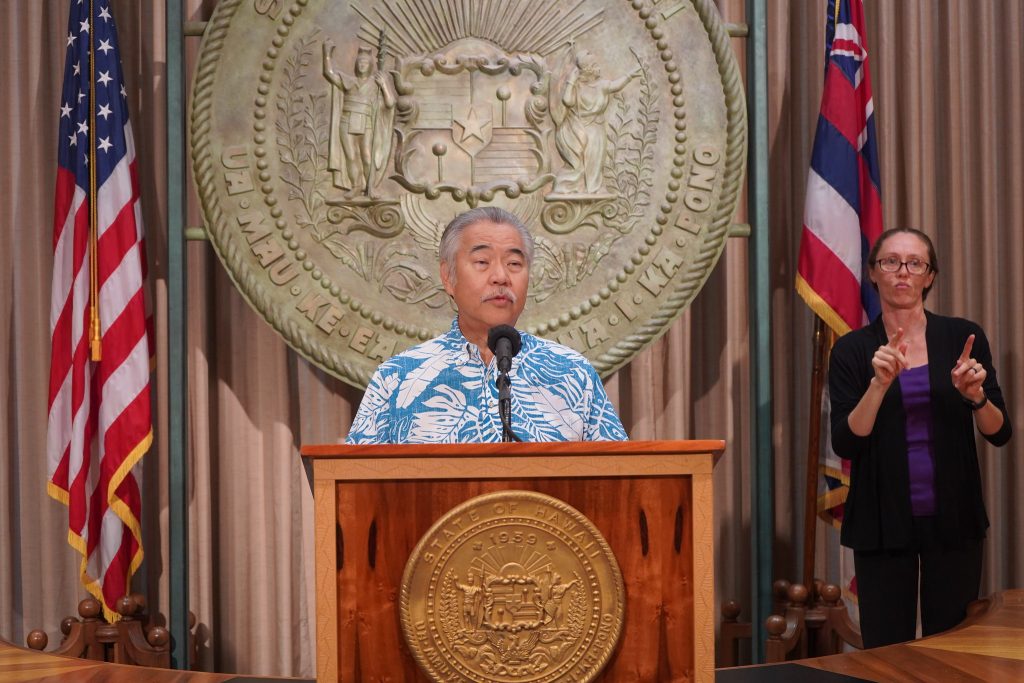Governor Ige vetoed 26 bills
[ad_1]
Governor David Ige announced today that he has rejected 26 of the 28 bills on his veto list. The governor today sent a notice of objection to the state legislature of Hawaii for each of the 26 bills, as required by the state’s constitution.
“There are more bills on the list than usual this year for two pandemic-related reasons, and lawmakers have had no control over the timing of either,” said Governor Ige.
First, he said the state’s economic condition is much better than it was at the start of this year’s legislature, and federal COVID-19 relief funds have helped the state significantly in addressing pandemic relief efforts. The return of visitors to Hawaii also prompted the Council on Revenues to increase its overall revenue forecast for the fund by $ 6.1 billion over a seven-year period.
“This means that we no longer need to carry out some of the extraordinary revenue measures proposed in this legislature,” said Governor Ige.
Second, the state did not receive US Treasury Department guidelines on the permitted use of federal life-saving appliances until after the April 29 legislature ended.
“In order to comply with the requirements of the Ministry of Finance, I am forced to veto several bills, which creates a gap in the state budget that needs to be closed,” said Governor Ige. “I will be working with the House of Representatives and the Senate to resolve this issue. It is crucial that we reach an agreement – otherwise we will not be able to move forward with the new CIP projects contained in HB200 – Concerning the State Budget.
HB53 – Related to Treasury Bonds and HB54 – Related to the State Budget and two line items in HB200 were declined because they seized federal funds for uses that were later banned by the US Treasury policy.
HB613 – Education has been vetoed due to concerns about compliance with state guidelines for the use of life-saving appliances. Hawaii is the only state in the country with a state education agency that is also a local education agency. Under US Department of Education guidelines, state lawmakers do not have the ability to restrict a local education authority on the use of funds provided by the CARES Act or ARPA.
“For this reason I vetoed HB613. We cannot risk paying back money to the federal government, â€said Governor Ige.
Policy / Implementation Concerns
Governor Ige vetoed other bills because of policy and implementation concerns, including:
SB811 – Regarding the Department of Education – COVID-19 tests in public schools are denied as the Department of Education and Department of Health have already established logs to report cases, notify contacts, and prevent transmission in Hawaii public schools. The measure would increase the potential for individuals to be identified and bullied, especially students living in small communities.
HB862 – In relation to the state government is making significant financial and functional changes to the Hawaii Temporary Accommodation Tax and Tourism Board. The bill is being vetoed over concerns that the move will seriously affect HTA’s ability to focus its efforts beyond marketing on destination management.
“Now, more than ever, we need to find a more sustainable balance in terms of the impact of tourism on our communities across the state,” said Governor Ige.
In addition, Governor Ige said that HB862 contains bugs that would make implementation difficult:
- The ARPA allocation of US $ 11 million from HB200 cannot and cannot replace the provision of special funds for the operation of the Hawai’i Convention Center.
- The lack of special funds makes it impossible to resume congressional activities in Hawaii. This is vital to developing a more sustainable tourism industry based on the quality rather than the quantity of visitors.
- The bill does not provide long-term planning and execution of a strategic plan for the operation of the Hawai’i Tourism Authority and the Hawai’i Convention Center.
- Additionally, counties would not be able to administer the county’s new TAT tax because the bill does not provide for how it will be collected, assessed and collected.
- After all, it is inefficient to create completely new tax collection systems for every county. Previously, the legislature gave the state the power to support the counties in the administration of tax collection, e.g. B. with the district surcharges. The legislature did not grant the state this power in this draft law.
NOT vetoed
HB817 – In relation to agriculture, removed from the veto list and entered into force on Friday 2nd July. Initial concerns included budget costs and operational implications for some government agencies. However, it was determined that the bill would help increase demand for local food products, which supports Governor Ige’s goal of doubling local food production across the state.
[ad_2]

